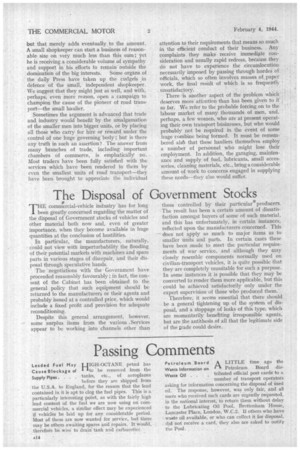The Disposal of Government Stocks
Page 16

If you've noticed an error in this article please click here to report it so we can fix it.
THE commercial-vehicle industry has for long been greatly concerned regarding the matter of the disposal of Government stocks of vehicles and other material both now and, even of greater importance, when they become available in huge quantities at the conclusion of hostilities.
In particular, the manufacturers, naturally. could not view with imperturbability the flooding of their potential markets with machines and spare parts in various stages of disrepair, and their disposal through speculative hands.
The negotiations with the ° Government 'have proceeded reasonably favourably ; in fact, the consent of the Cabinet has been obtained to the general policy that such equipment should be returned to the manufacturers or their agents and probably issued at a controlled price, which would include a fixed profit and provision for adequate reconditioning.
Despite this general arrangement, however, some surplus items from the various .Services appear to be working into channels other than those controlled by their particular producers. The result has been a certain amount of dissatisfactidn amongst buyers of some of such material, and this has unfortunately, in certain instances, reflected upon the manufacturers concerned. This does not apply so much to major items as tosmaller units and parts. In certain cases these have been made to meet the particular requirements of war service, and although they may closely resemble components normally used on civilian-transport vehicles, it is quite possible that they are completely unsuitable for such a purpose. In some instances it is possible that they may be converted to render them more applicable, but this could be achieved satisfactorily only under the expert supervision of those who produced them.
Therefore, it seems essential that there should be a general tightening up of the system of disposal, and a stoppage of leaks of this type, which are momentarily benefiting irresponsible agents, but are the antithesis of all that the legitimate side of the trade could desire.




















































